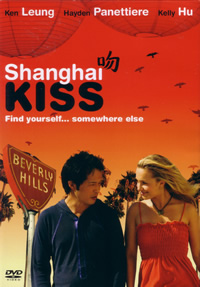SYNOPSIS:
Liam
Liu is a 28-year-old Chinese American actor struggling in Hollywood.
Adelaide is a 16-year-old free-spirited genius still in high
school. But when a grandmother who Liam never known leaves him
a family home he's never seen, he takes a first-time trip to
Shanghai that will change both their worlds forever. If life
is all about possibilities, can love survive a cultural divide
and a huge age gap?
MOVIE REVIEW:
Shanghai Kiss represents the direction that Hollywood,
in its dearth of new ideas, should look to for inspiration.
Indeed, it is refreshing to see a decidedly independent film
that eschews the theme of dysfunctional European American
families (just see The Squid and the Whale, The Savages, Margot
at the Wedding, and others of the same ilk).
What we have instead in Shanghai Kiss is a romantic drama
that enwraps the story of an Asian-American searching for
his identity, a challenge confounded by an innate sense of
belonging to his parent culture.
Raised in the States from young, Liam’s passion for
acting sees him dropping out of Columbia and heading west
to Los Angeles for the bright lights and glitter of Tinseltown.
But a few years later, he finds himself struggling as an aspiring
actor boxed in by the cultural stereotypes of Asian Americans.
"Can you do kung fu? Do you do taekwondo? What belt do
you have?" Liam finds himself asked when auditioning
for a toothpaste commercial in the movie’s amusing opening
scene. America sorely needs greater cultural awareness and
understanding. This is one lesson that the movie so aptly
portrays, especially in light of recent data that whites will
no longer be the majority in 2042.
But more than taking pot-shots at America’s cultural
myopia, Shanghai Kiss also captures the cultural dilemmas
that second-generation immigrants are likely to face. Liam
is forced to re-examine his cultural identity as an unexpected
death in the family leads him back to the land of his parents.
Although he feels a temporary sense of belonging among people
of his race, his inability to converse in Chinese and many
of his attitudes and values clearly differ from them.
Therein lies one of the most interesting questions that the
always smart and engaging script presents: how much of one’s
personal identity is and should be determined by one’s
own race? While Asian or Chinese by race, Liam has clearly
been brought up in a different culture. In fact, this cultural
tension is one which many second-generation immigrants have
to grapple with, a tension of assimilation with the majority
culture or acculturation of the majority culture with one’s
own.
First-time writer-director David Ren makes an impressive debut
with Shanghai Kiss, and he is aided most capably by a captivating
performance by Ken Leung. While Leung has played bit roles
in many movies before, this is probably the first time he
has been cast in the lead. Most admirably, he grasps his character’s
transformation from a confused individual to one coming to
terms with his identity very convincingly.
Asian Americans have seldom come into prominence in American
films, with the exception of perhaps Wayne Wang’s films.
But Shanghai Kiss is an auspicious beginning to the possibility
of more such interesting stories to emerge about this community.
Ultimately, the movie works on many levels, as an intimate
character study, as an examination of culture and identity,
but most importantly, it succeeds because it is a story with
much heart and empathy for its characters, told with a great
deal of warmth and sincerity.
SPECIAL FEATURES :
The most interesting feature on this Code 3 DVD is
the filmmakers’ commentary on the movie. Writer and
co-director David Ren gives an interesting take on what is
clearly a very personal story for him. Aside, there is "Behind
The Kiss: The Making of Shanghai Kiss" which
is more a collection of behind the scenes work on the set
of the movie than a documentary made about its filming. There
is also a featurette "To Shanghai and Back"
that features interviews with cast and crew.
AUDIO/VISUAL:
Great visual transfer that accentuates the beautiful cinematography
by Alexander Buono especially of the nightscapes of Shanghai.
Audio is presented in both Dolby Digital 2.0 and 5.1, although
the surround effects are really only more apparent with the
songs in the movie.
MOVIE RATING:
   
DVD
RATING :
  
Review
by Gabriel Chong
|

